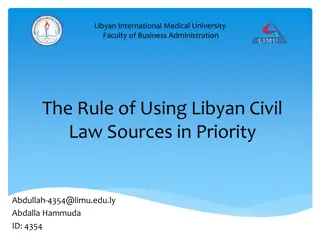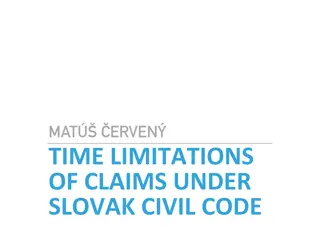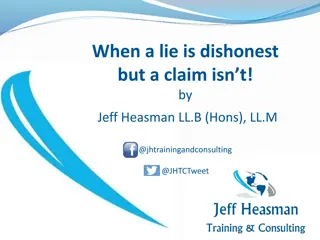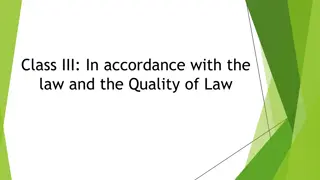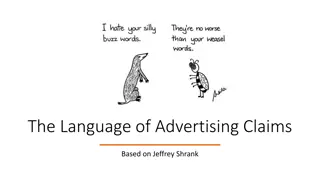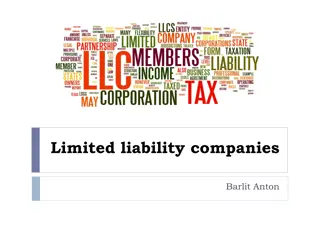Understanding Limitation of Claims in Polish Civil Law
In Polish civil law, time limits for bringing legal actions are divided into two groups: expiration and prescription. Expiration results in the extinction of rights, while prescription allows claims to be rejected only if the debtor raises the plea. The general regulation in the Civil Code stipulates that property claims are subject to limitation, with non-property claims not limited by prescription. Understanding these concepts is essential for navigating legal proceedings in Poland.
Download Presentation

Please find below an Image/Link to download the presentation.
The content on the website is provided AS IS for your information and personal use only. It may not be sold, licensed, or shared on other websites without obtaining consent from the author. Download presentation by click this link. If you encounter any issues during the download, it is possible that the publisher has removed the file from their server.
E N D
Presentation Transcript
Limitation of claims Prescription Vs Expiration
Expiration In Polish civil law the time limits restraining the possibility to bring an action at law to the court are divided into two groups. The first group of terms are distinguished with stronger legal sanctions of the time lapse for the creditor. When the term of this group expires, the creditor s right is recognized as extinct and may never be subject to court action. If despite of the time lapse, the creditor demands to perform the debtor s duty, the court ex officio (i.e., even without the debtor s petition and regardless to his intentions in this matter) always should reject the creditor s claims. Article 568 1 CC: the rights to sale warranty for physical product defects expire after the lapse of one year, and in the case of defects of a building, after the lapse of three years from the time of releasing the thing to the buyer.
Prescription/limitation The second group of terms is characterized with different result of time lapse, the claims and rights of the creditor are not expired and the creditor is not formally limited to sue the debtor nor to bring actions or claims at the court, but his demands may be rejected only if the debtor uses the prescription plea at the court. If the debtor forgets or does not intend to use this plea the court will issue an adjudicative sentence (off course it the demand is justified).
General regulation of prescription terms the general regulation in the first book of Civil Code and the specific regulation for some types of claims in nominate contracts and claims for damages compensation referring to torts. Art. 117 1 CC stipulates that: barring exceptions provided for by statutory law, property claims shall be subject to limitation. After a period of limitation has passed, the person against whom a claim is raised may evade the satisfaction of that claim
Claims limited in time The prescription refers only to the property claim, therefore if a claim is of non-property character (non- pecuniary) it may not be limited by prescription, for example, under Article 24 CC in case of an infringement the human personal rights (interests) he may demand that the person who committed the infringement perform acts necessary to remove its effects and in particular to make a statement of an appropriate content and in an appropriate form. The claim based on this demand is not subject to time limits, but when the victim person demands pecuniary compensation, the claim is of property character therefore is subjected to prescription.
Exemptions there are some claims that are excluded from the time lapse limitation if it is directly stated in statutory provisions: the 223 CC provides that the vindication claims of the owner specified in article 222 CC shall not be subject to limitation if they pertain to immovable property.
Time period 10, 3, 2 . unless a special provision states otherwise, the period of limitation shall be ten years and for claims pertaining to periodical performances and claims resulting from an economic activity, three years. However, a claim certified by a valid pronouncement of a court or other authority entitled to hear cases of a given kind, or by a pronouncement of a conciliatory court, and also a claim certified by a settlement made before the court or the conciliatory court or by a settlement made before a mediator and approved by the court, shall be barred by limitation of ten years even if the period of limitation for claims of that kind were shorte
Sale specific prescription term Art. 554 CC claims of seller made within the scope of sellers business enterprise, become barred by the statute of limitation after two years. And so is the time for default interest (if the payment is to late)
Preliminary agreement Claims that arise on the grounds of the preliminary agreement are barred by limitation of one year from the date on which the definitive contract was to be concluded. However, if the creditor demands to issue judgment that substitutes for the definitive contract, the limitation period for damages claims commences on the day in which the decision concerning dismissal of claim becomes valid
Torts Art. 442 (1)1 CC 3 years after the day on which victim learned the damage and the person responsible to remedy it. No longer then 10 years from the day when the damadge was made. Crime 20 years after the crime is commited regardles of the information as to the identity of offender
Start of prescription time Claim becomes due and payable. The period of limitation (prescription) shall begin to run on the day on which the claim has become due and enforceable. = capable of being enforced in the execution (after formal litigation under the court officer - komornik)
Pause and new beginning The running of the period of limitation may be interrupted and after each interruption of a period of limitation it shall run anew. The interruption is made: (1) by any act before the court or other authority entitled to hear cases or enforce claims of a given kind or before the conciliatory court, performed directly either to vindicate or to establish, or to satisfy or to secure a claim; (2) by the acknowledgement of the claim by the person against whom the claim is made; (3) by the initiation of mediation at the court.


